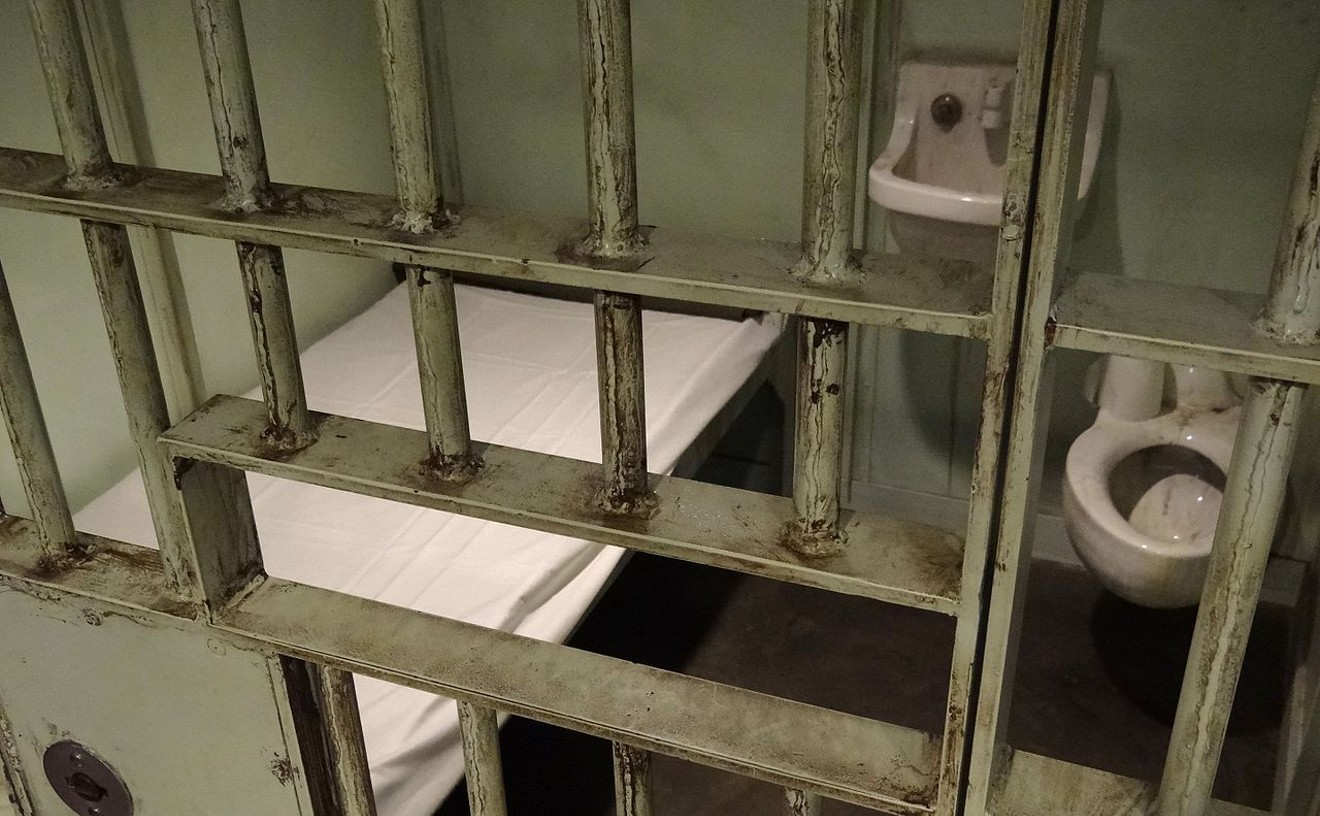Vallecillos is a laborer who has a different boss each day. He will paint houses, do construction, mow lawns, and clean buildings. He usually earns about $6 an hour, although that varies, depending on the employer. That's just enough to keep him afloat and give his estranged wife money for their two children.
For the past three years, Vallecillos has come to the corner of Ross and Carroll avenues in East Dallas. There, he drinks coffee and mingles with other workers in the parking lot of a bar that doubles as a worker pickup spot. Vallecillos and others have come to rely on this corner as an almost certain source of daily work. But starting this week, Vallecillos will have to find a new place to hawk the only ware he has to peddle: his labor.
The change follows the opening of the Cesar Chavez Learning Center, a bond-funded DISD project, across the street from the parking lot where the workers gather each morning.
School district officials, parents, even the League of United Latin American Citizens question the wisdom of allowing the laborers to mill around 100 feet from school doors. Yet at a recent meeting to discuss the opening of the school, the issue of security was tacked on, like a post script, to the end of the agenda. This past Monday morning, no formal plans appeared to be in place. Police cars drove by, occasionally stopping, but mostly just observing.
Most of the workers understand the situation, and some admit that women and girls do get whistled and stared at. But they say they're just regular guys looking for honest work. They'll move, but they don't know where to go.
Until they find a place, Dallas police are patrolling the area each morning and plan to continue until it's deemed clean. "I'm going to be coming through here every day, talking to them," says Dallas police officer Pedro Zamora, who's been patrolling these streets for 12 years.
Anyone who has traveled Central Expressway or driven along finely manicured streets has seen a day laborer. Mostly men, these workers gather at corners around the city to seek employment. Most locations are informal setups that eventually garner a reputation for producing jobs. Ross and Carroll has been a popular site for more than 10 years.
The issue is a sensitive one, says Alfred Carrizales of LULAC. Some of the men who show up for work at the corner might be fathers to some of the students. "We don't want to do harm to the day laborer," he says, but the children have to come first.
Not all day labor in Dallas is born on the street. Those in search of work can also show up at 1050 N. Westmoreland and take a number. Early roll call is at 7:00 a.m. The Texas Workforce Commission has designated this a controlled site in Dallas where laborers and contractors can go to fill jobs. Because the site is state-sanctioned, a certain formality exists. Grady Wafer, site coordinator, personally checks Social Security and identification for each employee. "They have to have permission to work in the United States," he says.
"We can make sure that people work for reputable employers," says L.E. Woolbright, administrator for Dallas' TWC employment program. Employers must submit work orders specifying the type of work, wage (at least minimum), and duration of the assignment.
No such controls exist for Vallecillos and others like him who gather on street corners each morning. What they do and earn is more or less up to the contractor. Because they do rely so much upon the contractor, there is considerable competition for jobs. The laborers are concerned that if they move from this corner, they will lose out on jobs for days or weeks because contractors won't know where to look for them. For men living hand-to-mouth, this could mean no food or rent. "I gotta eat. I gotta pay rent," says Antonio Navarro, a U.S. citizen from Los Angeles. Otherwise, he says, he may end up in a homeless shelter again. There, you have to contend with being mugged, robbed, beaten, or killed. Navarro shares an apartment with four other men and says he's one of the lucky ones--he is single and has no kids. Navarro's voice trails off as he jumps up and hails a truck. Another day, another dollar.
"Everyone looks for Hispanos because we work hard," says one middle-aged man from Monterrey, Mexico. Vallecillos chimes in, "Sometimes they pick up Americans, and then they bring them back. Every two hours, they want a break."
Vallecillos didn't always work as a day laborer. In his native Chihuahua, Mexico, he was pursuing a medical technician degree. With 18 months to go, he came to the United States to earn enough money to finish his education. But his father's death 11 years ago meant he had to continue working and forgo school.
Since then, Vallecillos has been earning a living any way he can. He has a work permit, which makes life easier for him. But many of these men don't have permission to work in this country legally. For them, street corners mean they too can earn a wage. "A lot of us want to work," Navarro says. "We could go out and sell drugs to make money, but we'd rather work."
Still, Vallecillos thinks moving the pickup spot a few blocks away is a good idea. He sees nothing but problems if the workers stay where they are. "I think we should leave," he says. "Otherwise, immigration will come and deport people. It's going to be problematic."
A stocky man who clearly disagrees with Vallecillos, Miguel Martinez, retorts, "We're in a Hispanic neighborhood, and they're trying to run us off. They see us chasing cars for work and yelling out in Spanish, and they get nervous." Martinez says anyone who gets up at 5 a.m. to look for work doesn't have time to waste bothering girls.
Others feel more strongly about it. "They can't move us from here, because this is a private location," asserts Jose Rodriguez from Cuba, referring to the parking lot of the Otra Parte bar where they gather. "This is a free country," says Rodriguez, who remembers how tough things are back home. He pulls out a black wallet and proudly displays his work permit.
Free country or no, it looks like the workers will have to move, either on their own or at the hands of others. The school district has requested stepped-up police security at the corner for the next several weeks. Cop cars will be roaming the streets in hopes of scaring away the remaining laborers. So far, it seems to be working; few workers were out on Monday morning.
"The best situation is to find a new place and start meeting there," says Zamora, who was out early Monday morning talking to the workers who did show up at the corner. Zamora says that, in the past, men on the corner have harassed girls, even chasing them. As for how far the men will have to go, Zamora says, "It's not a question of feet or yards, but of contact."
Contact with the students is not the only problem on this corner. "What nobody's saying is that when all of these guys run into the middle of [Ross Avenue], they cause traffic to stop and accidents to occur," adds officer J.E. Corden, who was also patrolling the area Monday morning. Local business owners "don't want these guys on their property," says Corden, "but they are afraid to file criminal charges." They're afraid their property will be vandalized, he says. The owner of Otra Parte could not be reached for comment.
Not only will the laborers have to leave, says Zamora, but the bar itself may encounter problems. With new zoning laws, Otra Parte may not be able to renew its liquor license. It probably won't be grandfathered in, either. More than likely, it will have to move.
Change takes time. But the face of Ross and Carroll is changing. Cars still whiz by on Ross Avenue every morning, and the car lot on the southwest corner remains heaped with trashy cars. But the new school seems to be ushering in a new phase for the neighborhood.
As young children file obediently through the doors of Cesar Chavez Learning Center, sporting new backpacks and smiles, the day laborers clutch their lunch bags and grip their coffee mugs. Under the sign "Otra Parte Nite Club," the few workers who remain gaze about, wondering where all the contractors have gone.
The sun rises quickly and soon begins to beat down on the parched pavement. Across the street, the children are all safe in their classrooms and, one by one, the workers peel off. They'll find something, they say without too much enthusiasm. They have to, for otherwise, one worker portends, we'll be "just another statistic.










